1790
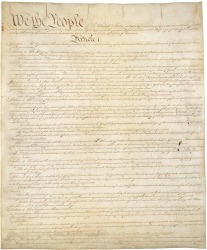
By a two vote margin (34-32), Rhode Island became the last of the original 13 colonies to ratify the U.S. Constitution.
1790
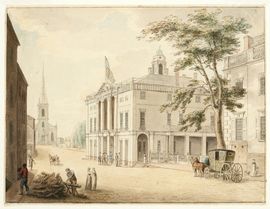
Joseph Stanton Jr., a native of Charlestown, and Theodore Foster, originally of Brookfield, Massachusetts, but later of Providence, were elected by the general assembly as the state's first United States senators.
1790

Joseph Stanton Jr., and Theodore Foster produced their credentials for office and took their oaths at Federal Hall in New York City. Afterwards Stanton and Foster drew lots to determine their Senate class assignments. Stanton drew the Class 2 seat (to expire in 1793) while Foster drew the Class 1 seat (to expire in 1791).
1797
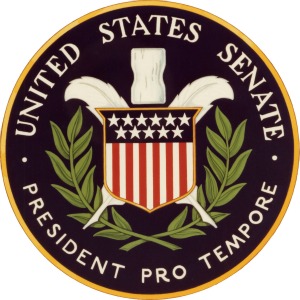
The Senate elected William Bradford as its president pro tempore. Bradford, originally of Plympton, Massachusetts, but later of Bristol, Rhode Island, had been a physician but abandoned his practice to study law before entering into politics.
1800
Senator Theodore Foster's younger brother, Dwight Foster, was elected as a United States senator from Massachusetts and they served together until their retirements in March 1803.
1809
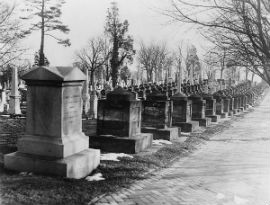
After less than three months in office, Senator Francis Malbone of Newport died on the steps of the U.S. Capitol. Malbone was later interred at Congressional Cemetery in Washington, DC.
1816

Senator William Hunter of Newport became chairman of the Committee on Commerce and Manufactures (today's Committee on Commerce, Science, and Transportation), serving until 1817.
1818

Providence-born senator James Burrill, Jr., became chairman of the Committee on the Judiciary, serving until 1819.
1820
A funeral service for Senator James Burrill, Jr., was held in the Senate Chamber. Burrill was later interred at Congressional Cemetery in Washington, DC.
1834

The Senate resolved the contested election between Senator Asher Robbins, originally of Wethersfield but later of Newport, and former representative Elisha Reynolds Potter of Little Rest (now Kingston). The incumbent, Robbins, retained his seat.
1842
A funeral service for Senator Nathan Fellows Dixon of Westerly was held in the Senate Chamber. Dixon was the grandfather of Senator Nathan Fellows Dixon, also of Westerly, who served in the Senate from 1889 to 1895.
1853

Senator Philip Allen of Providence became chairman of the Committee on Agriculture (today's Committee on Agriculture, Nutrition, and Forestry), serving until 1857.
1857
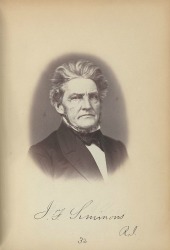
Ten years after the expiration of his term as Rhode Island's Class 2 senator, James Fowler Simmons, who was born near Little Compton but moved to Providence, was seated as the state's Class 1 senator.
1859
Henry Bowen Anthony, born in Coventry but later of Providence, began his 25 years of Senate service. During his tenure Anthony chaired the Joint Committee on Printing for a total of 21 years, 5 months, and 28 days, the sixth-longest tenure for a Senate committee chairman.
1862
Senator Henry B. Anthony became Republican Conference chairman, serving in that position until 1884. As chair, Anthony acted much like the later majority leaders, giving committee assignments to members of his party, calling up bills for debate, and often speaking for his party on the issues of the day.
1862

Senator James F. Simmons resigned his seat after the Committee on the Judiciary reported in July that the corruption charges leveled against him were essentially correct.
1869

The Senate elected Henry B. Anthony as its president pro tempore, a position Anthony was elected to 16 more times between 1869 and 1875.
1870
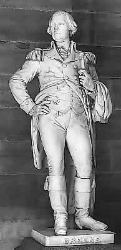
The Senate moved to accept a marble statue of Revolutionary War major general Nathanael Greene of Warwick, sculpted by Henry Kirke Brown, for placement in Congress's National Statuary Hall Collection. The statute was the first placed in the collection.
1872
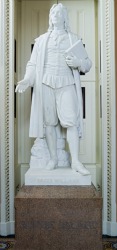
The Senate moved to accept a marble statue by Frank Simmons of Roger Williams, co-founder of the Colony of Rhode Island and Providence Plantations, for placement in the Capitol's National Statuary Hall Collection.
1873
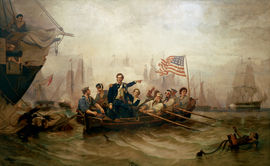
A painting depicting the "Battle of Lake Erie" by William Henry Powell was unveiled in the east stairway of the Capitol's Senate wing. The painting features United States Navy Commodore Oliver Hazard Perry, who was born and raised in Rhode Island. Perry earned the title "Hero of Lake Erie" for leading American forces in a decisive naval victory at the Battle of Lake Erie during the War of 1812. He was awarded a Congressional Gold Medal on January 6, 1814.
1873

Senator William Sprague was denied the chairmanship of the Committee on Appropriations after Republican Party leaders decided that his personal affairs had affected his mental stability. His wife, Kate Chase Sprague, was having an affair with Senator Roscoe Conkling of New York and his textile mills were bankrupt. The party's distrust of Sprague was sealed by his harangues on the Senate floor about the corrupting evils of wealth.
1877

Senator and Civil War major general Ambrose Everett Burnside, originally of Liberty, Indiana, but a resident of Providence, became chairman of the Committee on Education and Labor (today's Committee on Health, Education, Labor, and Pensions), serving until 1879.
1880
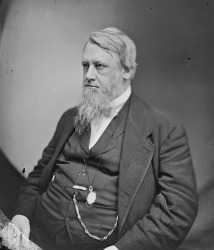
The Senate adopted what came to be known as the "Anthony Rule," allowing senators to speak no more than five minutes on certain measures before voting. Named for its sponsor, Senator Henry B. Anthony, this was the Senate's first effort to add a cloture provision to its rules. On March 19, 1884, it was formally adopted as Rule VIII of the Senate.
1881
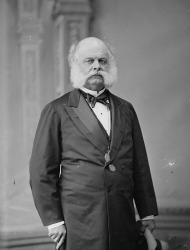
Senator Ambrose E. Burnside became chairman of the Committee on Foreign Relations, serving until May.
1881
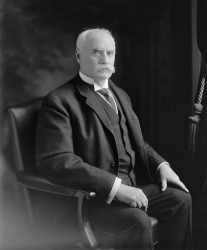
Nelson Wilmarth Aldrich, born in Foster but later of Providence, began his near 30 years of Senate service when he was appointed to fill the vacancy caused by the death of Ambrose E. Burnside in September. Aldrich was described by his secretary, and later Senate sergeant at arms (1919–1933), David S. Barry as "the suave and steel spined boss of the United States Senate."
1887
Senator Nelson W. Aldrich became chairman of the Committee on Rules (today's Committee on Rules and Administration), serving until 1893. Aldrich chaired the committee again from 1895 to 1899.
1898
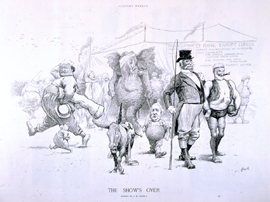
Senator Nelson W. Aldrich became chairman of the Committee on Finance, serving until his retirement from the Senate in 1911. During these years, Aldrich was one of the "Senate Four" who dominated the Chamber's deliberations. Aldrich served as a sort of floor leader before that position had been established.
1900

Senator George Peabody Wetmore, born to American parents in England but a resident of Providence, authorized William C. McCauslen, who had already depicted Vice Presidents William R. King and John Tyler, to execute the bust of Andrew Johnson for the Senate's Vice Presidential Bust Collection.
1913
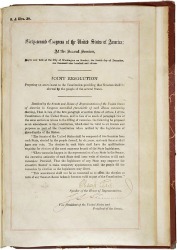
The Seventeenth Amendment, providing for the direct election of senators, became part of the Constitution. The amendment was first put into effect for the 1914 elections.
1916

Incumbent senator Henry F. Lippitt of Providence was defeated by Peter Goelet Gerry, originally of New York City but later of Warwick, in Rhode Island's first direct Senate election.
1918
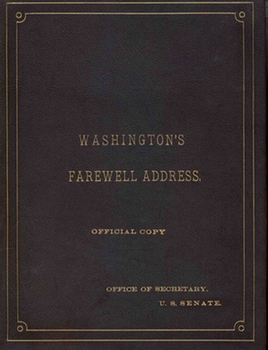
Senator Peter G. Gerry read George Washington's 1796 Farewell Address on the floor of the Senate Chamber, a tradition dating to 1862.
1919
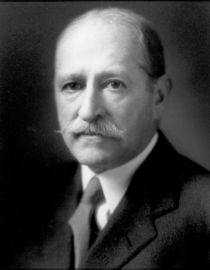
David S. Barry, the former editor-in-chief of the Providence Journal, was appointed Senate sergeant at arms and served until his dismissal in 1933.
1929

Senator Jesse H. Metcalf of Providence became chairman of the Committee on Education and Labor (today's Committee on Health, Education, Labor, and Pensions), serving until 1933.
1933

Senator Felix Hebert of West Warwick was appointed Republican Party whip and served until 1935.
1935

After losing re-election in 1928 to Felix Hebert, Peter G. Gerry returned to the Senate by defeating Hebert. Gerry served in the Senate for a total of 24 years (1917–1929 and 1935–1947).
1937
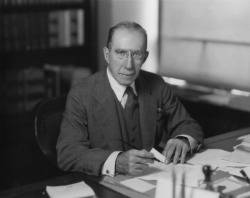
Theodore Francis Green of Providence defeated incumbent senator Jesse H. Metcalf of Providence and began his 24 years of Senate service. Green was the grandnephew of Samuel Greene Arnold of Providence, and the great grandson of James Burrill, Jr., both former senators.
1942

Senator Theodore F. Green read George Washington's 1796 Farewell Address on the floor of the Senate Chamber, a tradition dating to 1862.
1950

John Orlando Pastore of Providence took his oath of office, filling the vacancy caused by the resignation of Edward L. Leahy of Bristol. Leahy had been appointed in 1949 by then-governor Pastore to fill the vacancy caused by the resignation of James H. McGrath. Pastore was the first Italian American elected to the Senate and served for just over 26 years.
1952

Senator John Orlando Pastore read George Washington's 1796 Farewell Address on the floor of the Senate Chamber, a tradition dating to 1862.
1955

Senator Theodore F. Green became chairman of the Committee on Rules and Administration, serving until 1957.
1957
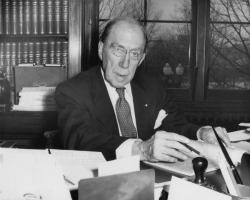
Senator Theodore F. Green became chairman of the Committee on Foreign Relations at the age of 89 and served until 1959. Greene was 93 when he retired from the Senate in 1961–the oldest man to have served in Congress until 1996, when he was surpassed by Senator Strom Thurmond of South Carolina.
1961
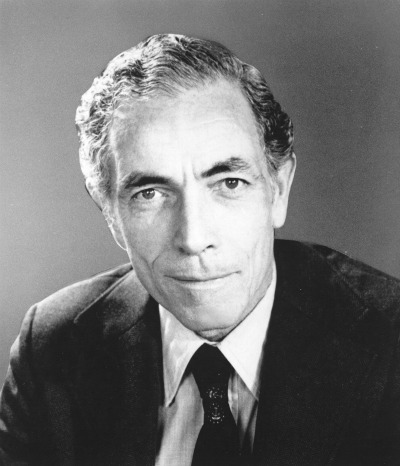
Born in New York City, Claiborne Pell of Newport began 37 years of Senate service during which he cast over 13,000 votes. When Pell left the Senate in 1997, he was Rhode Island's longest-serving senator.
1965
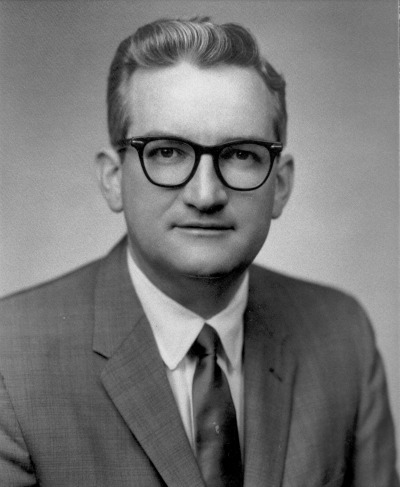
Rhode Island native Robert G. Dunphy became Senate sergeant at arms and served until June 30, 1972.
1965
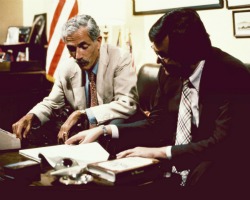
Senator Claiborne Pell sponsored the law establishing the National Endowment for the Arts and the National Endowment for the Humanities.
1972
The Senate passed an education bill that included "Basic Educational Opportunity Grants," which were later renamed Pell Grants. Senator Claiborne Pell was largely responsible for their creation. Pell Grants provide financial aid funds to U.S. college students.
1977
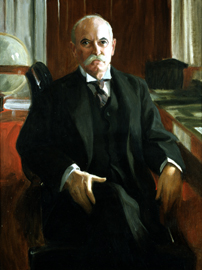
A portrait of Senator Nelson W. Aldrich by Paul Peter Kiehart was accepted by the U.S. Senate Commission on Art.
1978
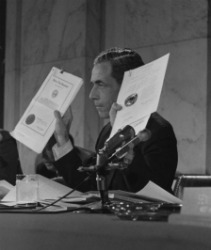
Senator Claiborne Pell became chairman of the Committee on Rules and Administration, serving until 1981.
1984
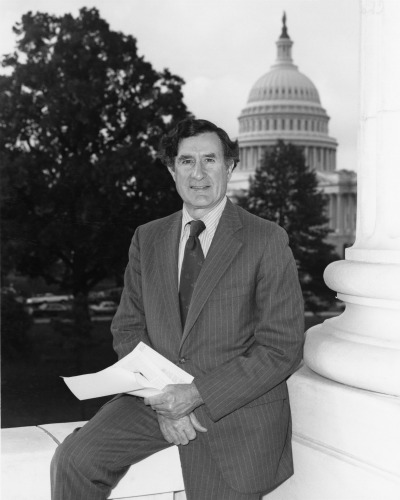
Senator John H. Chafee was elected chairman of the Republican Conference, serving until 1990.
1987

Senator Claiborne Pell became chairman of the Committee on Foreign Relations, serving until 1995.
1995
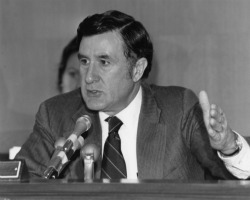
Senator John H. Chafee became chairman of the Committee on Environment and Public Works, serving until 1999.
2007

Senator Sheldon Whitehouse of Newport received the Golden Gavel Award for presiding over the Senate for 100 hours in a single session.
2021

Senator (John F.) Jack Reed of Jamestown, became chairman of the Senate Committee on Armed Services, a position he held until January 7, 2025.